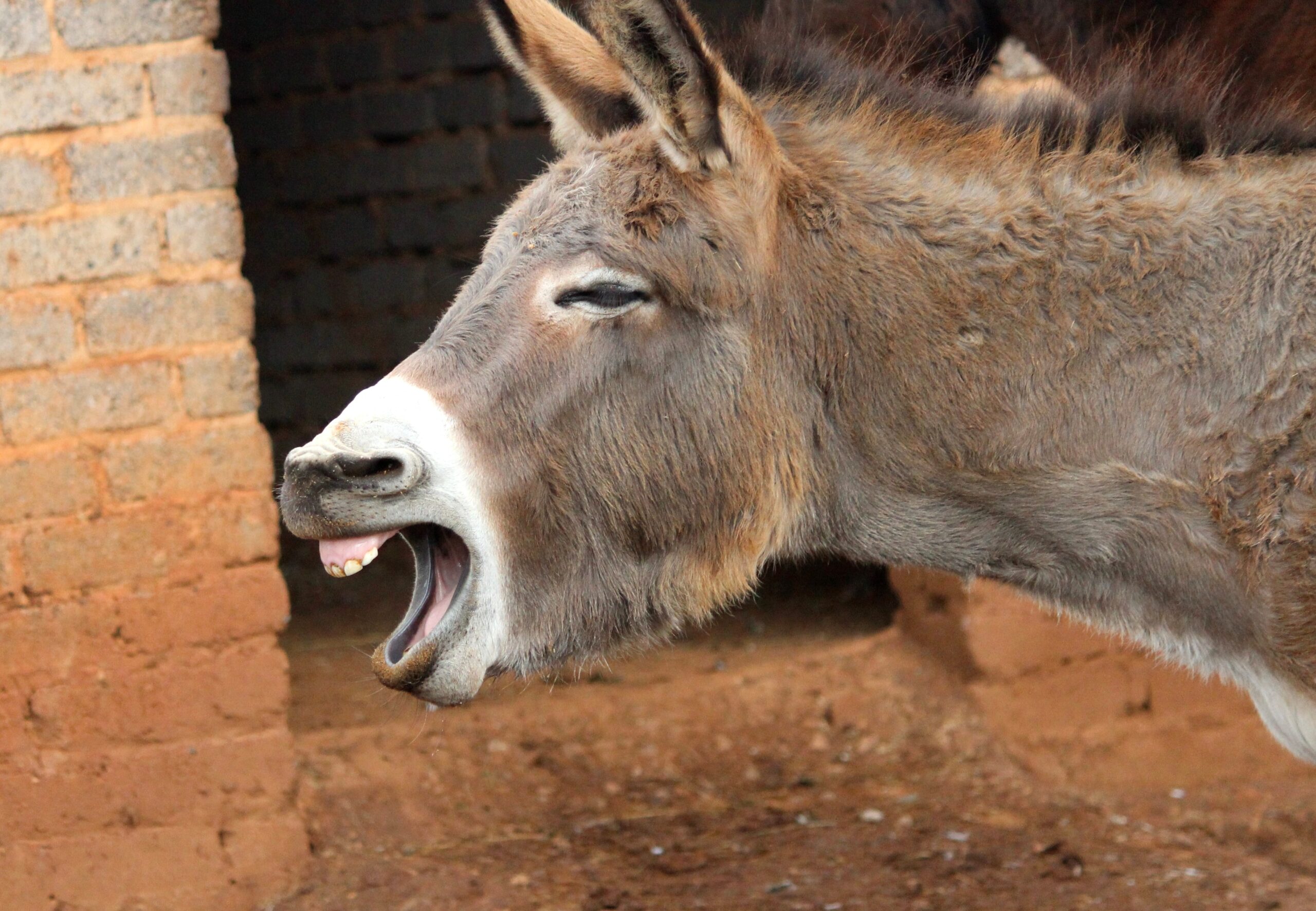Balaam—Good Guy or Bad Guy?
By Alastair Hayward, The Munich Bible Study, Co-Leader
From a canter through the Book of Ecclesiastes to Elijah’s great showdown with the prophets of Baal on Mount Carmel, we now look at the enigmatic character of Balaam. Was he a good guy or a bad guy? Why?
Who is Balaam? Balaam is a non-Israelite prophet whom we meet in the book of Numbers, chapters 22-24. He is a diviner who is importuned by Balak, king of Moab, to place a curse on the people of Israel, who are camped threateningly on the plains of Moab.
Balak summons Balaam and promises to honor him richly. But Balaam responds, “Even if Balak gave me all the silver and gold in his palace, I could not do anything great or small to go beyond the command of the Lord my God” (Numbers 22:18).
And then again, when Balaam meets Balak, he first says to him, “But I can’t say whatever I please. I must speak only what God puts in my mouth” (Numbers 22:38).
He is a good guy, isn’t he? As he talks about the Lord my God and will only speak what God puts in his mouth—which is precisely what all other preachers and I try to do. But if he is a good guy, why do several New Testament references criticize Balaam?
In Revelation 2:14, we read, Nevertheless, I have a few things against you: There are some among you who hold to the teaching of Balaam, who taught Balak to entice the Israelites to sin so that they ate food sacrificed to idols and committed sexual immorality. (Read the entire passage Revelation 2:12-17).
And he is also mentioned in 2 Peter 2:15, They have left the straight way and wandered off to follow the way of Balaam son of Bezer, who loved the wages of wickedness. (Read the entire passage 2 Peter 13-16).
If Balaam consistently said that he would only say what God told him, where did he do wrong? Let’s take a deeper look at the above passages from the Book of Numbers and learn together.
To set the scene, shortly after the Exodus out of Egypt, the people of Israel arrived on the border of the Promised Land in the desert of Paran. Moses sent 12 people (1 from each of the 12 tribes) to spy on the land. They came back with good reports but also said that giants populated it and that “we can’t attack those people, they are stronger than we are” (Numbers 13:31). And that,” We seemed like grasshoppers in our own eyes, and we looked the same to them” (Numbers 13:33).
Hearing this, the people rebelled and refused to enter the Promised Land. As a result, God said that none of those adults who came out of Egypt would enter the Promised Land. Only Joshua and Caleb would enter as they were not fazed and trusted in the Lord. Now it is forty years later, and after wandering in the wilderness, the people of Israel are back just outside the Promised Land and encamped opposite Jericho.
Only a handful of the adults who came out of Egypt remained. The rest died during their time in the wilderness. Having just defeated Shinon, king of the Amorites, and Og, king of Bashan, Balak, king of Moab, is terrified as about 600,000 Israelite fighting men are camped on the outskirts of his territory. They have also defeated his former overlords. So, we are at the bottom right-hand corner of the Land of Israel if you look at a map.
King Balak (he helpfully has a “K” on the end of his name for King—in case you, like me, get confused between him and Balaam) sends for Balaam, who is both a diviner and a prophet, to get him to curse the Israelites. Balaam is in Pethor, near the river Euphrates, about 400 miles away. It would have taken about three weeks to get there by camel train. So Balak has sent for the best in the witch doctor business to curse the Israelites because he says, “For I know that whoever you bless is blessed, and whoever you curse is cursed” (Numbers 22:6).
What kind of man is Balak? His name means “Devastator,” so he was probably a charming fellow! He is ruthless and uses his chequebook to get what he wants. He believes every man has his price, so he is used to using his wealth to get whatever he is after. He is an unscrupulous man of the world.
Balaam (and his name means Devourer) is a bit of a mystery. He seems to meet with God and claims he obeys God, but at the same time, he is a pagan magician available for hire. Elsewhere in the Bible, we are told that God’s people should not get involved in the occult on consult mediums.
In Deuteronomy 18:10-12, God is explicitly clear about forbidding occult practices. “Let no one be found among you who sacrifices their son or daughter in the fire (because that is what the worship of Moloch one of the Canaanite gods involved), who practices divination or sorcery, interprets omens, engages in witchcraft, or casts spells, or who is a medium or spiritist or who consults the dead. Anyone who does these things is detestable to the Lord; because of these same detestable practices the Lord your God will drive out those nations before you.”
So why did Moses want the second generation to know about Balaam? The book of Numbers is essentially Moses reminding the second generation of the history of the people of Israel. I think he wants them to look at their enemy and understand that a spiritual battle is going on.
In John 16:2-4, Jesus warns his disciples, “All this I have told you so that you will not fall away. They will put you out of the synagogue; in fact, the time is coming when anyone who kills you will think they are offering a service to God. They will do such things because they have not known the Father or me. I have told you this, so that when their time comes you will remember that I warned you about them. Jesus wanted them not to be surprised by hostility. I think that it is the same for Moses.
Also, in Revelation, we see the veil of Heaven drawn back and are shown in picture language the spiritual battle going on in the spiritual realm.
Let us look in greater detail at Numbers 22:21-31:
Balaam got up in the morning, saddled his donkey and went with the Moabite officials. But God was very angry when he went, and the angel of the Lord stood in the road to oppose him. Balaam was riding on his donkey, and his two servants were with him. When the donkey saw the angel of the Lord standing in the road with a drawn sword in his hand, it turned off the road into a field. Balaam beat it to get it back on the road. Then the angel of the Lord stood on a narrow path through the vineyards, with walls on both sides. When the donkey saw the angel of the Lord, it pressed close to the wall, crushing Balaam’s foot against it. So he beat the donkey again.” Then the angel of the Lord moved on ahead and stood in a narrow place where there was no room to turn, either to the right or to the left. When the donkey saw the angel of the Lord, it lay down under Balaam, and he was angry and beat it with his staff. Then the Lord opened the donkey’s mouth, and it said to Balaam, “What have I done to you to make you beat me these three times?” Balaam answered the donkey, “You have made a fool of me! If only I had a sword in my hand, I would kill you right now.” The donkey said to Balaam, “Am I not your own donkey, which you have always ridden, to this day? Have I been in the habit of doing this to you?” “No,” he said. Then the Lord opened Balaam’s eyes, and he saw the angel of the Lord standing in the road with his sword drawn. So he bowed low and fell facedown.”
I think that this story is meant to be funny. We are to laugh at it. Balaam is intended to be a man of spiritual power, but he is spiritually blind. He is supposed to be the best diviner in the whole of the ancient Near East, but his donkey can see the spiritual reality more clearly than he. Donkeys have a reputation for not being very clever (think Eeyore in Winnie the Pooh) and also for being very stubborn. Yet, the donkey saw the angel, but the world-famous pagan magician saw nothing.
Then finally, in the third incident, the donkey lies down, and Balaam goes completely nuclear. He appears to get so angry that he does not even notice that he is talking to a donkey.
But finally, he sees the spiritual reality and bows down before the angel. Then the angel of the Lord rebukes Balaam and tells him only to speak to Balak about what he, the angel, tells him.
Balaam goes on his way, and Balak, the king, is so impatient and desperate that he goes all the way to the border of his territory to greet Balaam and hold a feast in his honour.
What do we learn from this? God uses the donkey to show that God’s enemies are silly and that they are no threat to the God of Israel. God’s chosen people are unstoppable.
We should learn not to worry. We should look at the enemy but remember that God is all-powerful. The enemy does not present a real threat. We are in the same position as the Israelites. For them, the Exodus was behind them, and they were just about to take possession of the Promised Land.
For us, the cross is behind us, and we have not yet reached heaven. We don’t know what the future may hold. Good things or bad things. Redundancy, conversion of a friend, depression, growth of the church, or reduction of the church. We may face difficult times, but ultimately, as we know from Romans 8:28, And we know that in all things God works for the good of those who love him, who have been called according to his purpose.
Look at the enemy, but we don’t worry as God is all-powerful.
Let’s consider the second part of the reading. Balak has hired Balaam to curse the Israelites, but he keeps blessing them, much to Balak’s annoyance. In verse 1, Balaam did not resort to his usual black arts of divination. As he looked out from the top of the mountain over the Israelite camp set up around God’s tabernacle, he saw that God had a bright future in store for them:
How beautiful are your tents, Jacob,
your dwelling places, Israel!
“Like valleys they spread out,
like gardens beside a river,
like aloes planted by the Lord,
like cedars beside the waters.
Water will flow from their buckets;
their seed will have abundant water.
“Their king will be greater than Agag;
their kingdom will be exalted.
“God brought them out of Egypt;
they have the strength of a wild ox.
They devour hostile nations
and break their bones in pieces;
with their arrows they pierce them.
Like a lion they crouch and lie down,
like a lioness—who dares to rouse them?
“May those who bless you be blessed
and those who curse you be cursed!” (Numbers 24:5-9)
Aloes are not native plants and have healing properties. Cedars were strong trees. God’s power is with them, and he will bless them. It is very encouraging that this outsider is saying these things about their future.
In Numbers 24:17-19, we see a fascinating Messianic prophecy coming out of the mouth of Balaam right back here before the Israelites had even entered the Promised Land. Based on their style, some commentators believe these are some of the oldest words in the Bible. Gods coming ruler is invincible.
“I see him, but not now;
I behold him, but not near.
A star will come out of Jacob;
a scepter will rise out of Israel.
He will crush the foreheads of Moab,
the skulls of all the people of Sheth.
Edom will be conquered;
Seir, his enemy, will be conquered,
but Israel will grow strong.
A ruler will come out of Jacob
and destroy the survivors of the city.”
This would have unsettled King Balak as king of the Moabites.
Someone is coming. But not now and not near.
A star is a sign of a king, and a scepter symbol of royal authority. When Queen Elizabeth was crowned in 1953, she was given a beautiful scepter to symbolize her authority. A coming King was to defeat all the enemies of God’s people. Balaam was very anxious that Balak would get the message that you can’t resist God and those who do will be destroyed. The coming King will rule over God’s people and rescue them.
As you probably know, with prophecy, there are often three fulfillments. One, when the prophecy is uttered or fairly soon after that, one when Jesus came for the first time, and one when Jesus will come for the second time on the last day. So the “then” fulfillment is probably King David, Israel’s greatest king, who came on the scene about 300 years. But even he did not fully live up to this billing. The second fulfillment is Jesus initiating the Kingdom of God. But the final fulfillment will be when Jesus starts his complete reign on the Day of the Lord.
We see this prophecy echoed right at the end of the Bible in Revelation 22:16-20, “I, Jesus, have sent my angel to give you this testimony for the churches. I am the Root and the Offspring of David, and the bright Morning Star.” The Spirit and the bride say, “Come!” And let the one who hears say, “Come!” Let the one who is thirsty come; and let the one who wishes take the free gift of the water of life… He who testifies to these things says, “Yes, I am coming soon.”
And what about Balaam? Later in chapter 31, we find out that after cursing did not work, Balaam advised the Moabites to lure the Israelites into immorality and that this more subtle strategy worked. God sent a plague that killed 24,000 of the Israelites. And that strategy still works today, and we regularly hear of Church leaders falling into sin, so we need to be on our guard against that and pray regularly that Church leaders will not fall into sin.
But also, Balaam was strangely stupid because, in Chapter 31:7-8, we find out what happened to him. “They (the Israelites) fought against Midian, as the Lord commanded Moses, and killed every man. Among their victims were Evi, Rekem, Zur, Hur and Reba—the five kings of Midian. They also killed Balaam son of Beor with the sword.”
The Israelites killed him while he was with the Midianites. So, although he prophesized that the Israelites would destroy their enemies, he stayed with the enemies of God’s people even though he knew, or should have known, that they would be on the losing side.
In summary:
- We should be encouraged that our all-powerful God is in control, and although there is an enemy, God has overcome him.
- We should not be like Balaam, as he was double-minded. We should be wholly committed to God, and he is in charge and has great plans to bless his people.
–Photo by Lena Bauermeister on Unsplash







